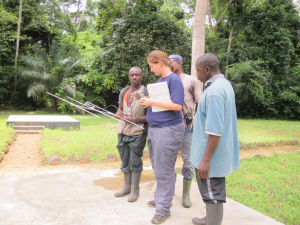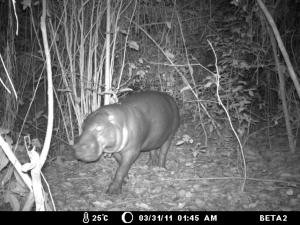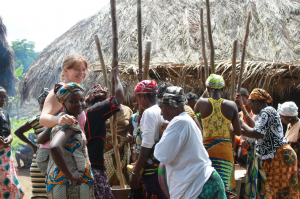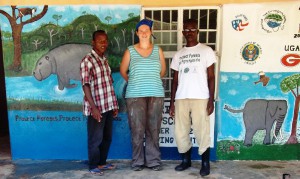 My journey began when I travelled to the remote Tiwai Island Wildlife Sanctuary located on the Moa River in Sierra Leone. I set out to study the endangered pygmy hippopotamus (Choeropsis liberiensis), a very solitary and elusive animal that is notoriously difficult to study in the wild. Armed with 20 remote-sensing camera traps, my goal was to capture pygmy hippos on film. In addition to obtaining photographs, I explored methods to physically trap a pygmy hippopotamus so that we could attach a collar and track the animal through the forest. To raise awareness for the plight of the pygmy hippopotamus, I collaborated with several conservation organizations to conduct environmental education in schools and villages.
My journey began when I travelled to the remote Tiwai Island Wildlife Sanctuary located on the Moa River in Sierra Leone. I set out to study the endangered pygmy hippopotamus (Choeropsis liberiensis), a very solitary and elusive animal that is notoriously difficult to study in the wild. Armed with 20 remote-sensing camera traps, my goal was to capture pygmy hippos on film. In addition to obtaining photographs, I explored methods to physically trap a pygmy hippopotamus so that we could attach a collar and track the animal through the forest. To raise awareness for the plight of the pygmy hippopotamus, I collaborated with several conservation organizations to conduct environmental education in schools and villages.
 I spent almost every moment with my two local field assistants. We worked together in the forest and travelled around the countryside to explore areas for hippos. While we worked, we discussed all aspects of our cultures, trying to understand the differences and find where we had common ground. These men became my brothers, and the villagers, my second family. Kenewa, one of my field assistants, loaned me his grain storage room to sleep in when I needed some “people time” off the island. He carved my name into the door and declared the room would always be mine, no matter where I was in the world.
I spent almost every moment with my two local field assistants. We worked together in the forest and travelled around the countryside to explore areas for hippos. While we worked, we discussed all aspects of our cultures, trying to understand the differences and find where we had common ground. These men became my brothers, and the villagers, my second family. Kenewa, one of my field assistants, loaned me his grain storage room to sleep in when I needed some “people time” off the island. He carved my name into the door and declared the room would always be mine, no matter where I was in the world.
 Although work took up much of our time, my team and I would sometimes go to the local dances. Dee-jays would set up shop in a village meeting area and we would dance the night away. The relationships I developed gave me a unique perspective on conservation. I witnessed the frustrations that wildlife conservation can bring in an area where people are struggling daily for survival. I have learned to enjoy every day as it comes and cherish relationships. I have also learned to work better with people, to maintain patience even when things are difficult, to manage employees and to try to understand all sides of conflicts before making a decision. By employing over 60 local people over the course of my research, the villages began to see some benefits for conserving the island.
Although work took up much of our time, my team and I would sometimes go to the local dances. Dee-jays would set up shop in a village meeting area and we would dance the night away. The relationships I developed gave me a unique perspective on conservation. I witnessed the frustrations that wildlife conservation can bring in an area where people are struggling daily for survival. I have learned to enjoy every day as it comes and cherish relationships. I have also learned to work better with people, to maintain patience even when things are difficult, to manage employees and to try to understand all sides of conflicts before making a decision. By employing over 60 local people over the course of my research, the villages began to see some benefits for conserving the island.
Fulbright enabled me to interact with and influence hundreds, if not thousands, of people. I am a stronger person when dealing with adversity and have come through the experience with a new insight into the world. I also obtained some great results for my research: video footage of pygmy hippos eating and pictures of animals never before documented on the island including the majestic bongo. The highlight of my research was when the U.S. Ambassador came to visit the island for a night, and the villagers put on a fantastic cultural show complete with a ‘pygmy hippo devil.’
My advice to those applying for a Fulbright grant is:
- Pick a project that is your passion. This is your time to do what you want!
- Tell a story with your personal statement and explain your project in a way comprehensible to those outside your specialty (no jargon!).
- In country, try to do an extra project outside of your own research. You’ll meet new people and maybe have an adventure you never expected.
Top photo: April Conway, 2010-2011, Sierra Leone (center), training local field assistants in radio telemetry techniques that track wildlife through the forest using radio waves
Middle photo: A pygmy hippopotamus caught on camera on Tiwai Island
Bottom photo: April Conway, 2010-2011, Sierra Leone (left), with women preparing rice flour for a funeral in Kambama village




